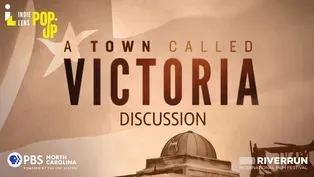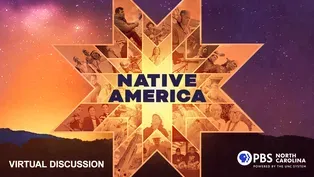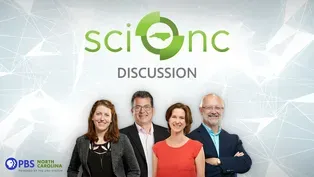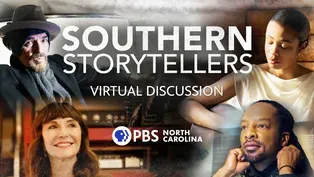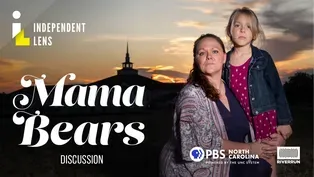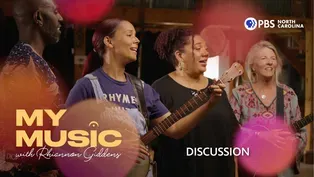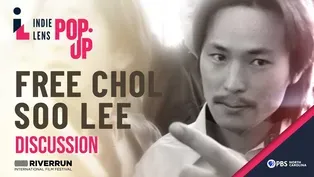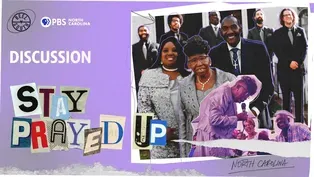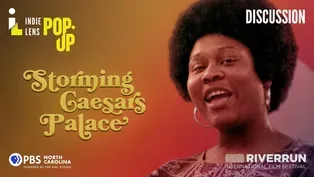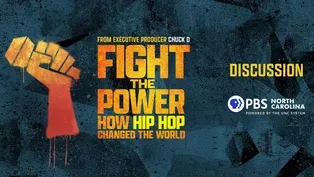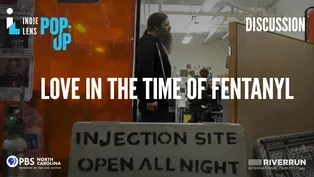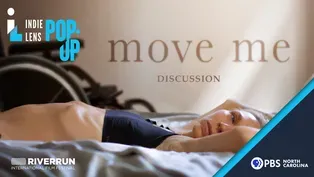PBS North Carolina Specials
Discussion | POV: The Neutral Ground
8/26/2021 | 40m 57sVideo has Closed Captions
The Neutral Ground filmmaker CJ Hunt talks about the removal of confederate monuments.
Following our film screening, filmmaker CJ Hunt, local educator Rodney Pierce and student organizers discuss symbols to systems, the removal of confederate monuments, critical race theory and current events.
PBS North Carolina Specials
Discussion | POV: The Neutral Ground
8/26/2021 | 40m 57sVideo has Closed Captions
Following our film screening, filmmaker CJ Hunt, local educator Rodney Pierce and student organizers discuss symbols to systems, the removal of confederate monuments, critical race theory and current events.
How to Watch PBS North Carolina Specials
PBS North Carolina Specials is available to stream on pbs.org and the free PBS App, available on iPhone, Apple TV, Android TV, Android smartphones, Amazon Fire TV, Amazon Fire Tablet, Roku, Samsung Smart TV, and Vizio.
Providing Support for PBS.org
Learn Moreabout PBS online sponsorshipMore from This Collection
Discussion - A Town Called Victoria - Independent Lens
Video has Closed Captions
The filmmaker and former Victoria residents share their story. (46m 51s)
Discussion - Native America Season 2
Video has Closed Captions
Panelists discuss preserving the languages of Native American tribes. (39m 1s)
Video has Closed Captions
Sci NC executive producer and host, Frank Graff, chats about upcoming Season 6 of Sci NC. (26m 6s)
Discussion - Southern Storytellers
Video has Closed Captions
Author David Joy and others discuss storytelling and their new PBS series. (42m 13s)
Discussion - Mama Bears | Independent Lens
Video has Closed Captions
Producer and director Daresha Kyi discusses the film and LGBTQIA+ advocacy. (34m 41s)
Discussion - My Music with Rhiannon Giddens
Video has Closed Captions
Discussing the series with producers Will & Deni McIntyre and country artist Rissi Palmer. (39m 56s)
Discussion - Free Chol Soo Lee | Independent Lens
Video has Closed Captions
Local lawyers, professors and nonprofit leaders discuss wrongful convictions and reentry. (40m 44s)
Discussion - Stay Prayed Up, Reel South
Video has Closed Captions
The filmmakers discuss their journey with Mother Perry and The Branchettes. (45m 4s)
Discussion - Storming Caesars Palace | Independent Lens
Video has Closed Captions
Local professors and nonprofit leaders discuss welfare and the social safety net. (33m 2s)
Discussion - Fight the Power: How Hip Hop Changed the World
Video has Closed Captions
Local experts discuss the history of hip hop with PBS North Carolina. (59m 43s)
Discussion - Love in the Time of Fentanyl | Independent Lens
Video has Closed Captions
Local harm reductionists, therapists and others discuss the opioid crisis and more. (55m 44s)
Discussion | Independent Lens: Move Me
Video has Closed Captions
A dancer with blindness and disability advocates discuss adaptable arts programs. (38m 46s)
Providing Support for PBS.org
Learn Moreabout PBS online sponsorship- Good evening, I am CJ Hunt from the film you just watched, I'm the director of "The Neutral Ground" and I just wanted to say thank you for watching this film.
Let's all collectively take a deep breath, I know the film leaves us all in different places, so let's take a deep breath on 3, 1, 2, 3.
[breathing loudly] Felt good, let's do one more.
[breathing loudly] Thank you for showing up for this film and for being here for this convo.
I really wanna thank PBS North Carolina for inviting me to screen this film and to host this discussion tonight and I'm also really thrilled that so many of you have logged on, like this, we have been going to festivals with this film, but this is the biggest screening I've ever had in a community, in a single community and seeing sort of the ideas and reactions that y'all are having in the chat, it was really inspiring to me and I'm excited to be able to have this conversation about the Confederacy, about North Carolina and about the nation's history.
I'm calling in from New York in an apartment that doesn't have air conditioning, so you'll see that I'm sweating, but that was a choice, so y'all know that I'm really putting in the work, but I wanted to acknowledge that I'm joining this call from New York, which is the unceded lands of the Lenape people and outside of my window, just a couple of blocks away is one of the nation's largest Christopher Columbus monuments and a lot of you remember and some of you are part of the removals of Christopher Columbus monuments all across the country.
So, I named that as where I'm calling in from, because I think it's important to frame the conversation tonight, right?
That this is not just a conversation about the south, or the deep south, this is a conversation about the nation and what it takes for us to tell the truth about our history and I push us in this call to also, whenever we are talking about Confederate symbols, to be able to push that one step further, that we are having such a rich conversation about Confederate symbols, can we bring the same type of rigor and honesty to other symbols of statues that are pretending to be neutral, but are in fact, to a troubling history that maybe we don't talk about enough.
I'm joined tonight by a really impressive group of educators and organizers and I wanna introduce them to you right now.
So, our first panelist is a middle school social studies teacher with Nashville Public Schools and, sorry, with Nash Public Schools and he was voted to be 2019 North Carolina Council for the Social Studies Teacher of the Year and is also a graduate student in the North Carolina State College of Education, please give it up in your own home, clap for yourself and pretend that we can hear you for our first panelists, Rodney D Pierce.
Rodney, how you doing?
- Good evening CJ, thank you for having me, sir.
- Good evening, you are not from Nashville, you are from North Carolina, I will scream at myself later on [laughing].
Thanks for joining us, especially on a school night.
Our next panelist is a founder and the president of the Wake County Black Student Coalition and is an organizer, sorry, president of the Wake County Black Student Coalition, an organization dedicated to uniting all Wake County students to help end systemic racism through student engagement and education and this speaker is also an undergraduate student at Appalachian State University, please clap in your own home just to yourself and the people with you for Victoria Smith.
[slightly clapping] - Hi, I'm in my college dorm.
- Hi.
Yes, yes.
Yeah, so, sorry Rodney, I have to revoke all the credit that I'm giving you for being with us on a school night, Victoria, you are with us on a school night in your college dorm.
- Everyone's out, but there's like some concert going on, I was like, "Nope, I'm gonna be here talking about "things that are important," so I am here, I'm ready.
- Great, sometimes you gotta kick the roommate out so we can reckon on a zoom with hundreds of people.
- Exactly.
- Thank you for being here.
And our last panelist is a former UNC Chapel Hill Student Organizer and the impact producer of participatory documentary "Silence Sam," which is a film I know a lot of the folks on the call have seen, which is just an incredible film about the movement to remove UNCs Confederate Monument, also known as silent Sam from the campus and the work of silencing student activism on that campus that went along with that fight.
Please, this is the last time I'll ask you to just clap in your homes alone for our final panelist, Courtney Symone Staton.
- Thank you, so good to be here.
- Yes.
- I'm also calling from a college campus different part.
- Let's go.
Let's go.
For this talk that is so much about history and education, thank y'all for bringing it with your locations, perfectly framing this convo.
Tonight we are here to discuss the film, y'all are gonna have time for questions, so feel free to throw those questions in the chat at any point and we will get to those in about 10 minutes, but I wanted to talk with our panelists about some of their reactions to the film and some of the resonance that they're feeling in their work.
So, Victoria I wanna start with you.
So, so much of this film is about the exceptional, unbelievable at times, lengths that the UDC, the United Daughters of the Confederacy went to go to make sure that all school children, white and black north and south, were not learning the truth about slavery in their history class, we just watched 82 minutes of that.
Talk to me about why you founded Wake County Student Coalition and why one of your demands, even in 2020, had to be around the teaching of history.
- So, kind of going back, now that I'm in college freshman about like two summers ago, so when I was a little baby and I was going from my junior year to my senior year of high school, so it was the middle of pandemic, COVID and the murder of George Floyd, it just happened, there was a huge uprising in Raleigh and coming across the country, but I remember it was May 30th, I'll never forget that day, it was the first day of the big protest that kinda came about in Raleigh and so I spent, probably like two, three weeks, like going out everyday with my friends and like we were on the streets protesting and calling for justice and change within our system.
And so, actually one of my really good friends, so I graduated from NL High School and one of my really good friends Yacob Lama, him and I had kinda been talking and realizing, every time that we go out, it was a lot of things led by adults, or college students, or people who were older than us and one thing that I know is that even though I'm young, I am very outspoken and I will let you know my opinion and we can talk and have discussions and stuff.
And so I told him, it was like the one thing we're missing is having a group, a coalition, something that is led by students for students and so I was like, you know what, if no one's gonna do it, why not us and so then we founded the Wake County Black Student Coalition, ever since then, it has been an uphill battle trying to talk to different admin, the board of education, people in like these higher position of power, because a lot of times they look down on us because we are students, but that definitely has not stopped us and will not stop us, so.
- It's so wild to me how consistently folks forget that students run every major social revolution that we have in this country, it's like you turn 30 and start shopping at West Elm and you're like, "I don't know if we can trust students, "they're on the TikTok," it's like, who do you think we're doing the city?
- I don't know.
I. mean, the thing is we can solve these different equations and take these AP, advance, like I was a dual enrolled student, so I was an, Raleigh we have a thing called Wake Tech, Wake Technical Community College, so I was enrolled in high school and in college, taking college classes and I'm doing all these advanced things, but I can't tell you my basic needs and wants as a black student, like they get very picky and choosy about what they wanna hear and so it shocked me too, but it's really just upsetting.
- Going on that for a second, talking about basic wants and needs as a black student and a black person in the world, going back to 2020, like the urgency is so high, right?
The things that folks are asking for is like, "Please don't shoot us in the street, "please don't bring tanks when we are trying to protest, "please think about ways to use this money for other things "that can keep us safe," talk to me about what your demands were and why history is on that list of demands.
Do you know what I mean, that for some folks, history seems sort of esoteric or like wide if the demands are this dramatic and urgent, why does history curriculum fit on that list for you?
- So, the biggest thing is we had five main demands and I have been in college for two weeks, so I can't think of them off my head, but they are posted on our Instagram, which I can [indistinct] below, but essentially they all consisted of like learning about history in schools, holding our administration and teachers accountable of like racial bias and understanding what that truly is, 'cause a lot of them don't know, when predominantly our more teachers are mostly white females, so when you grow up in a society where you weren't taught these different things, you don't know how you are then putting that on and oppressing that to others, to the students that you teach, so holding them accountable.
We also did a thing, one of our demands was for sexual assault accountability as well, because while we are focusing on black students and like that's our main focus, our focus is also for every student and for every marginalized group and sexual assault is a big thing that happens in high schools that aren't addressed, it's also about accountability with sexual assault and having this anonymous way of like being able to report this, because it's a really, really, really big deal.
I mean, it ranged from a list of like different things, but a lot of them were just basically focusing on like support for black students, because so many of us don't have the support that we need, that our white counterparts get naturally and so we need to be uplifted and heard and seen and so.
- What strikes me is that when I knew that your demands included curricular change, I was like, I assumed that it comes from a place of like, "I need access to this," but what strikes me so much in you saying that is you're like, "No, my teachers need to be trained in this "so that when we're talking about what is happening "with George Floyd, my teachers have a reference for that."
- Exactly.
- Speaking of teachers, Rodney, you are a teacher, you are, what's wild to me is that you've been involved in both helping to bring down a Confederate monument and in helping to create new social studies curriculum, not just for one school, but for all of North Carolina, right?
- Yes sir.
- In other words, that's like Robert E. Lee's worst nightmare, right?
[laughing] So talk to me about, besides making the rest of us look bad, those of us who only choose monuments or only choose curriculum, while you're out here doing it all, talk to me about why those two fights are related for you.
- Oh, you flatter me sir, you flatter me.
Those two fights are related to me because it's all about breaking systems of injustice in terms of the lack of empowerment for African-Americans, particularly for those of us who descend from those of us who were enslaved here in America for hundreds of years.
When you talk about the Confederate monuments, your documentary stated it plainly and I've always said this since I did the research myself and found it, you're talking about the lost cause, but the Cornerstone Speech by Alexander Hamilton Stevens, the vice president of the Confederacy makes it plain, this nation, the Confederacy is built off of the inferiority of black people and the superiority or supremacy of white people.
The Confederate constitution specifically cites Negro slavery, not indigenous slavery and that's not to dismiss the enslavement of indigenous people, not enslavement of any other group of people, but specifically Negro, Spanish for black, black people.
So, on one hand you have these monuments that are standing up, excuse me, are up in the country to symbolize the lack of power that you have, even hundreds of years following the supposed victory, the passage of the Reconstruction Amendments, this supposed victory, you still have these monuments standing around, some in predominantly black counties like Halifax, that are basically.
- Not some Rodney.
Folks, just take a moment, let's just take a moment and think about where the highest concentrations of Confederate monuments are, Richmond, New Orleans, right?
Like these are some of, the black Atlanta, these are some of the blackest cities in America and I think that's sort of lost on folks, so I just mean, it's not some, that's the rule, if you had slaves and you were a stand for slavery, then those, when they were free, those enslaved people stayed there, so now you have majority black towns with Confederate monuments and without the local rule to be able to take down those monuments.
- Yes, sir.
And so, you just have this lack, you just feel this lack of power, '[cause it's like, Okay, we're in the quote on quote majority in this area, but we don't have the power to remove something that reminds us of when we were in chains, when we had no power, when people base their system of government off of our supposed inferiority, then when you come to the other side of it with curriculum, again, where is our power and developing what students will learn in North Carolina schools.
And we're not just talking about students of color, we're talking about all students.
But now in North Carolina, the majority of those students are students of color, 25% of them are African-American.
And so it was like, if we're not going to teach the true history of our state and our country, we're doing a disservice to our students.
Are we gonna whitewash this too?
Are we gonna UDC this too?
Or are we going tell the truth based on the evidence.
I don't like to say facts anymore, I say, what is the evidence, what does the evidence show?
- Yeah.
- You know what I mean?
And that goes back to what I was saying about the Confederate constitution in the Cornerstone Speech, because those are the things that need to be taught when you're talking about the Civil War, because there're going to be kids that you teach who come from homes, who are going to be people who believe in the lost cause, or who are going to say it wasn't about slavery and you need to be able to present those documents and say, "Okay sir, okay ma'am, "read this and tell me what you think."
- I wanna move it to Courtney right now because I wanna make sure we get time for questions here, but I am with you, that in a way a monument is a textbook that you can keep in public for a hundred years, right?
Like, there is no other form of text that you can write in a private group that lasts that long.
And, as you're talking about UDC being a verb, like we can UDC that, the most disturbing scene in the film, the one that people consistently wanna talk to us about, is that scene where you see the UDC rewriting those textbooks and I think the question that I think you're posing is, if you acknowledge that that's true, right?
If you watch that scene in the film and see that through the seventies, we had textbooks that told kids that slavery was fine, what does it take to undo that, right?
I'm gonna throw it to Courtney now, our last speaker, before we're able to get to some of these questions, but Courtney talking about that, UDCC, talking about the lost cause as this, as one of the oldest propaganda campaigns in the country, right?
So, this multigenerational effort to say that slavery wasn't bad and that the war was about something other than all of the documents that the Confederacy wrote, that's called the lost cause, right?
And I'm interested in what you can still see echoing from the lost cause today.
- Yeah, I'm thinking about like, just CJ, as you were speaking about the Confederate monument as a textbook, I was even thinking about education and then a little bit of it flipped way of like, do you to see, Karen Cox has a book called "No Common Ground," where she's talking about how members of the United Daughters of the Confederacy literally said that the process of re-educating students to teach them that the Civil War was fought over states' rights was the equivalent of making them into living monuments.
And just thinking about the fact that we're literally seeing that repetition in the critical race theory laws that are coming out now, there are 23, I think, at least like 23 states that have presented bills banning critical race theory, or like the teaching of divisive topics and if we go into, like the language of the bills, it's just stuff like, it has nothing to do with critical race theory, it's just like, it's the bill making folks feel guilty about being white, or.
- Let me drill in on some of that language, so, this bill is called House Bill 324, right?
So, everyone Googled this because, Courtney, I feel like when everyone was sort of looking at North Carolina around what's gonna happen with Nicole Hannah Jones, it seemed like folks weren't focused on the idea that North Carolina's state reps were passing and very well might be successful in passing a law that keeps teachers like Rodney from teaching the very history that him and Victoria are talking about, right?
So, some of that language is, prohibiting anything that makes students feel a sense of guilt, shame or anguish.
Rodney, as a teacher, if that were to pass and become a law, what sections of your social studies would you not be able to teach?
- I mean, the way I teach in my classroom, I told my students today, I'm not gonna pull punches when it comes to this stuff again, I'm going to show you the evidence and you decide for yourself whether it's good or bad, but I'ma show you the evidence.
I mean, can I talk about women's suffrage?
'Cause we want to talk about nothing to make people feel sexist, if I talk about how men kept women from exercising the right to vote, is that gonna make a young man feel bad?
If I talk about chattel slavery and that the majority of the slave owners in the United States were white people, is that gonna make white students feel bad?
If I talk about the UDC and the lost cause, is that gonna make white females feel bad?
Today I was talking about the fact that this bill, HB 324, okay?
This bill is coming out of a legislature where the majority of the legislators are white male Republicans and the language in it is taking, almost directly, from the September 2020 Executive Order Issue by former president Trump, when he said we're not gonna have any more diversity trainings or anti-racism trainings in the federal government, another white male Republican.
If a young man comes from a household that is headed by a white male Republican, is that going to make him feel guilty or depressed or anxious, when I'm just giving you the evidence based off of it?
- I'm laughing because it's like we're built super specific?
- Manifest destiny.
I mean, let's go ahead and open it all up, I mean, what you really want to do is silence me from saying anything in regards to race or gender that might be looked at as being something that perpetuated injustice in the United States in our history.
That's what you really want to do, you're just gonna make me shut up and not say anything and want to leave teaching.
- I mean, I hope no one makes you shut up, Rodney, but what is so wild to me, right, is like, okay, I understand that some white men feel weird when you talk about the history of white supremacy, but the idea that you could make that into a law that makes you not able to teach and Victoria not able to learn about Frederick Douglas, or women's suffrage, like that seems so, that seems so wild to me, partly because so many of America's things that we trumpet, right?
Every day you can find someone talking about Martin Luther King and the Montgomery Bus Boycotts, like without talking about white supremacy in those epics, that's just a dispute about water fountains, or like where the good seats are on the bus.
So, I want to close this section with you Victoria, being a young person still, right?
Everyone's like, "It might make students par" It's like, you are a literal student, you were in high school like a second ago.
And I'm saying that with all respect, because you are our student expert on this panel, what are the young folks that you know, how are they reacting to the idea that their state might pass a law that means that they can't learn difficult history?
Are they like, "That's just noise," or are they like, "Yo, this is crazy."
- We are pissed off and I know I can speak for majority of my school when I say that at least like NL High School class of 2021, like we are pissed off.
- Can I just jump in real quick, can you please not use the word pissed off because it makes me feel discomfort and anguish.
- We are very, very, very, very very angry.
I can say that with confidence, we are very upset.
- Don't say that, that makes me feel guilty.
- The thing is it's so, the issue that I have already is as a black student, like the issue that I was taught from Rosa Barks to Ruby Bridges, to just black history, I was taught that from my parents.
So, my white counterparts have no idea, like not even talking about critical race theory, like just basic black history, all they know is like MLK, the standard, like Rosa Parks on the bus, like that's it, no one knows true, how we can get in depth about all of these other black, I mean not black, excuse me, white, like cis-gender like males in positions of power and Columbus, but not the fact that he raped and murdered countless women, you know what I'm saying?
We learn about these historical white males as these superheroes and dah, dah, dah, dah, when it comes to black history, we learn nothing, I was talking to actually Courtney about this earlier about the facts of like, so at NL, we have a class called AP European History, literally like AP White History, but then on the flip side of it, if you want one about black history, the only class you can take is a single standard elective class.
So, not even looking at like the facts or looking at like going in depth, but like the basic standard of your GPA, when we look at standard classes versus AP classes, they literally give you more credit for your GPA, for your grade point average so that you can get a higher GPA.
So, if I take an A, or if I get an A in both classes, I'm going to get more credit for the AP European Class than I am for that black, or it's called African-American studies class.
So you are- - No.
- History less value, like if that doesn't show you like the fact of like, I'm literally having less value for one of my history than learning about white history, I don't know what to tell you, that is literally like the point average is higher than the other and so I was also saying like, it's not a matter of white history versus black history, it's a matter of learning about all history.
So, if that includes indigenous, that includes trans, that includes any of the LGBT community history, disabled history, Latin X history, it's not just about black and white, it's learning about all history and all identities so that we can learn and become more educated about those around us, not just ourselves and so that's my thing, is I will always say like, we are very upset and I think that we need to do better and be better and the fact that we are literally going back instead of moving forward is honestly embarrassing and I mean I just, I don't think about myself when I think about the work that we do, I think about my little sister who is a sophomore, excuse me, a junior now, she's all grown up and the kids that I babysit, the kids that I help with them, I have kids someday, like what I want them to learn, what I want them to experience, it just, it breaks my heart, but we're gonna fix this one way or another.
- Yup.
Yup.
I mean, folks, stop making Victoria feel embarrassed, because this is embarrassing Victoria and we can't embarrass her or her sister.
I mean, what is so wild to me about that is, yes, you're right, that it is a panic about, one, a word that has been around for 50 years and two, a type of teaching that only really makes up, I just saw a news report the other day that said it makes up 10% of class time, black history makes up 10% of class time.
Only 8% of high school seniors nationally can identify slavery as a cause of the Civil War.
So, what's wild to me is just like what you're saying, it's this panic about this tiny, it's like being like, "Oh my God, it's getting out of hand "how much music they're teaching in public schools.
"Every day they're putting recorders in kids' hands" it's like, you think that that's the majority of what we're doing with class time?
We can't afford recorders, because you've cut funding to it.
- We only learn in February, that's it, we get February and then it's done.
I'm gonna go super speed right now because we got eight more minutes and I wanna get, we have a couple of questions in the chat, folks, hit us up with questions in the chat, please, they can be questions about the film, they can be questions for our panelists, but this is gonna be super speed round because I know we only have eight minutes, all right.
So, first question is for me and it is "How long did it take you to make this film "and what drew you to New Orleans?"
It took me five, between five and six years.
So, folks who are trying to make films, that's how long it takes.
And, it started in the winter of 2015 when I was living in New Orleans, I had been a teacher, I had been working for the public defender and I was trying to make a career in comedy and in 2015, as you saw in the beginning of the film, that's when New Orleans City Council voted to take down its monuments and I thought that this was gonna be a quick process where we could record people saying ridiculous things about, "If you move a monument, what is history?"
You know, like things that I thought didn't make sense and as you saw, it became a big thing, we didn't know that Donald Trump was gonna be president, we didn't know that Charlottesville was going to happen, we didn't know that we were going to see insurrectionists attack the Capitol and try to kill congressmen and while I am not happy that any of those things happened, I do think it makes it easier for folks to understand the lost cause and to understand the Civil War in a different way, right?
That before people are thinking about the Civil War in a Ken Burns way and when you say, "Hey, there was kind of this story written "that skewed the facts," people, that sounded crazy to folks, but now that we've seen a big lie born in front of us, now that we've seen someone say what you saw with your eyes didn't happen, those are not insurrectionists, those are actually patriots, now that we've seen that happen in our present, I think folks understand the film differently.
The other question that we had is, "What are you supposed to do with, "how are you supposed to deal with folks that say things "like Thomas Taylor says in this film, "the Whitney Museum is full of lies."
So, I think this question, I'll put this back to the panel and I'll go to Courtney, a resident disinformation expert, for folks who refuse to, a quick request for folks in the chat, if y'all can still see the chat I want you to, if those succession documents were new to you, I just want you to write the words "New to me," I just wanna see some numbers, because for me, I didn't know that any of those things existed until 2015 when I started making this film.
Maybe I had heard about the cornerstone speech, but the idea that none of us had ever heard, on the film team, had read the founding documents of the one nation that tried to break away from the United States, that was wild to me.
And it's wild that you don't have to search very hard for slavery, it's like in most of the first sentences and all of those documents, they're called the declaration of causes, you can just look up secession documents, declaration of causes, they're all on a helpful website called google.com.
But, for any of those documents, for all of the work, Courtney, that I'm gonna do with teachers, we're trying to work with as many teachers as possible, so if you know a teacher out there who rocks with this film, who wants to teach a section of this to their eighth grade class before, I don't know, their state legislature makes that illegal, get with us as a film.
Courtney, for those who are unconvinced by those documents, who are unconvinced by the Whitney, how do you still talk to those people, should you still talk to those people?
- I feel like that's a layered question, I'm thinking about for black folks or for folks who are organizing stuff, there's a point where I'm like, we can organize our own community and thinking about who are the receipts for, there are a whole bunch of young folks who still need to be on gaslight, who are still like sniffing the air and being like, "Yo, I think it's weird that "my school is like named after Robert E. Lee and that "the person down the street is saying that racism ended "in the civil rights movement" and stuff like that.
So I feel like there's a lot of potential there of thinking about, I think that's who the document's for, like that's who the un-gaslighting processes is meant for, to me, but that's different for like, if you're a white person, if that's your uncle, the person that you're trying to talk to, who are saying that the Whitney is racist, is your uncle, then and you're that person, I think we can take, you can take your step back and then think about a long-term relationship, sending resources and, I don't know, I'm not white, so I don't know that process, but for black folks, I think it's more so about uplifting our own narratives and stories and stuff.
- I agree, I think I'm gonna give each of y'all one last minute for our closing here, but I think that's it, start with documents, right?
So, again, call out to teachers.
If you know a teacher that is like, "Oh my God, "that document section, I could show that "to my eighth graders," you can find us on all the socials at It's Not Neutral, Courtney will put it in the chat and our website is neutralgroundfilm.com, but if you know a teacher, connect us with them, right?
So, I think showing those documents, like that one scene when you see it was about slavery, the greatest material interest in the world, it's kind of hard to make an argument after that, I hope our film can do heavy lifting for you in that regard.
I say, go in with empathy, me as a northerner, I'm constantly talking about Andrew Jackson and Columbus, because I know the story of the south is not my story, like I am coming in with empathy about like, yeah, I grew up hearing that the pilgrims were great and the whole time I was like, "Didn't they kill "all these native Americans?"
So like, if you have some empathy, but then also know when to stop, right?
Like ask yourself, what can I do with my energy if I'm not trying to convince white supremacists that white supremacy is real?
What can I do with all that leftover energy?
Closing thoughts to y'all, I wanna start with Rodney, I think it is easy for folks to see a documentary and feel like that is activism, right?
That, that is the action themselves, folks are watching "Take 'Em Down NOLA" and feeling good about democracy, which by the way, Courtney is also gonna put "Take 'Em Down NOLA's" Venmo in the chat, whenever you'll watch documentaries and you see activists and they make you feel good about democracy, maybe support them.
Rodney, with all of us feeling a good feeling, or feeling the fear that we're feeling, what do you want folks leaving this screening thinking about for the rest of the week?
- Supporting teachers who want to teach this complete history of North Carolina and the United States of America in the classrooms, empowering them, encouraging them, taking up for them at these board meetings, where people go in talking about things they really don't understand.
Questioning and contacting your legislators who have never taught in classrooms a day of their lives, but want to try to tell people who are trained in teaching, who went to school for it, who are licensed to do it, what they're supposed to do, what they can and can't talk about in the classroom, empower teachers, support them, those types of things and have these conversations with your children in your homes about the real history of the United States.
Let them decide whether it's good or bad, but show them what the evidence shows.
It's just like being in a courtroom, present your case.
- You're right.
I think part of the argument that, "It's gonna make our kids hate America," is, kind of treats our kids as fragile, right?
Like if your kid's watching "Dora the Explorer" and going "No Swiper, stop swiping," you think they're not gonna understand Christopher Columbus?
You think they're not gonna understand Andrew Jackson?
Our kids aren't fragile and all of their cartoons show that.
Courtney, I wanna go with you next, give us a hot 20 seconds, 30 seconds, what do you want folks leaving thinking about?
- I feel like we have a lot of questions right now of trying to figure out if this is a flash in the pan, or if it's like an actual movement and I feel like, what I've been getting to is the fact that that decision depends on whether or not we can actually reckon with our history and tell the truth about what's happened, not just in post civil war and reconstruction, but also thinking about even recently and thinking about when students are attacked by police officers, before Nicole Hannah Jones is granted tenure, we can be truthful about that experience and if we can be truthful in our board rooms, some stuff is going down right in front of you, all of that is like a stack folded charge that we have.
Trying to remove all Confederate monuments, both the living monuments to the Confederacy and the concrete symbols that are still standing all over North Carolina, so.
- I feel that, right?
The erasure that's happening isn't just of the past, it's erasure of stuff that's happening now.
- Yeah.
- Right?
I want to end with Victoria, what, another hot 30 seconds, with the fear that folks are feeling, with the hope, hopefully with the power that folks are feeling, what do you want their brain stuck on for the next week, next month, next year?
- I honestly just want you guys to know that like, I'm 18 and I am exhausted, this work is not easy, so kind of similar to what# Mr. Rodney was saying, support those activists out there who are doing this work, learn, educate yourself, when you think you've done enough, do more, you can never stop learning about this kinda stuff.
I'm exhausted, but I know that gen Z we are coming to change and to make action happen and so I encourage you guys, no matter what age or wherever you're at in life, like you can cause change to happen and you can enact that with your community and those around you and even if you do that with your neighbor, having conversation with her or somebody you saw at church, or like, those small conversations has a ripple effect and it really makes a difference, so I just, I encourage you guys and I challenge you guys to go out there, learn and also learn about your community, what's happening with your community, things like this, it's important to look at the news and all that great stuff but also start home and start here learn about what's going on in your community and how you can get involved as well.
- Victoria, drop us the website for where we can support you and these other organizers who we promise, we collectively promise, don't we, folks who are watching, that we will do what we can to make you not exhausted and to make your peers not exhausted.
That's it for the night, I wanna thank all of our wonderful panelists, this is the last time, clap for all these panelists in your home, make the neighbors wonder what's happening in your home by how loud you clap for these folks.
I wanna thank y'all for joining us, a special shout out to Greer Web, for helping Courtney and I find such incredible panelists like Rodney and Victoria and put this panel together, Greer, thank you for your work.
Thank you all for logging on and participating in this convo, right?
Y'all showed up, some of you are in apartments like mine, where you were sweating the whole time and some of you were just sweating internally at what it means to sit for 82 minutes, thinking about the reckoning that this country has to do.
Special thank you to our event hosts, PBS North Carolina, for allowing me to share this film and these folks found me a long time ago, like right when the film was coming out and you guys have given me nothing but support and really, really showing us that you see us and you see what this film can do in the world and can do in the classrooms.
On behalf of PBS North Carolina, I also wanna thank our promotional event partner, RiverRun International Film Festival, please check on the survey in the chat to provide your comments, I know some of y'all don't stand surveys, but this helps us have more of these good sharp convos, you'll also receive an email early next week with survey link, helpful resources and links to this discussion and other ways you can deepen, you can watch the film via PBS North Carolina's video on demand service called Passport, right?
And I say this, a lot of y'all have Hulu with the stars add on and you have Disney Plus and you have all these other things that you're paying like $17 a month for and you're still like, "Oh, I gotta pay for PBS?"
This film was funded with PBS funding.
PBS funds some of the best films that are out there and makes them free for the nation this is what democracy looks like.
So, if you wanna share this film, go and sign up for Passport and support your local North Carolina PBS station.
Thanks again everyone for this evening and I just wanna echo what Victoria is saying, go be fearless, go tell the truth, the world needs it.
Have a good night.
